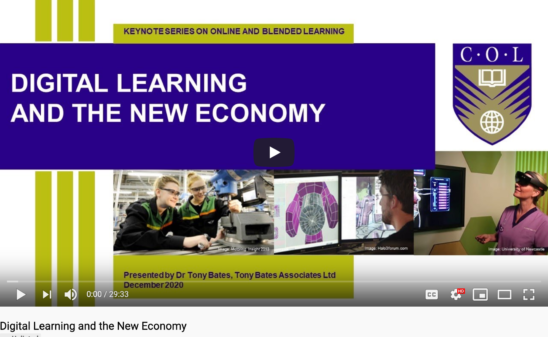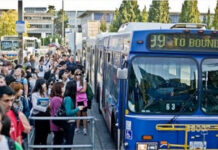Sleepless nights and global learning
I received many requests last year to deliver keynotes into virtual conferences. These requests came from all around the world. Unfortunately though (unlike Toronto), Vancouver is not the centre of the universe, so often I was having to get up in the middle of the night to deliver the keynote ‘live’ because of the time difference. Of course, I could have said ‘no, but often these were heartfelt pleas for help which I did not want to refuse.
However, I found that most requests could be met by by one of five different keynotes, each on a different aspect of online learning. (At four in the morning, everything is ‘deja vu’ so sometimes I was forgetting which country the keynote was going to.)
The concept
Now I did get an honorarium or fee for most of these, but I decided that my sleep was worth more than the money. So I approached Professor Asha Kanwar, the President of the Commonwealth of Learning, and asked her if CoL would be willing to record five keynotes and put them up for free downloading on the CoL YouTube and Vimeo channels. She kindly agreed. The five keynotes were recorded and edited in December 2020 and January 2021. They take into account the impact of the Covid-19 pandemic.
These 40-50 minute keynotes can be downloaded without cost from the Commonwealth of Learning’s online institutional repository for learning resources and publications, OAsis, under a Creative Commons license. The intention is that these can be streamed during virtual conferences, included in education and training programs, or watched individually.
Under the Creative Commons license, the videos can be edited, translated or combined. There is no charge for downloading, but attribution (acknowledgement of the contribution of Commonwealth of Learning and myself) is required if used in a conference or training program. Re-sale is prohibited under the Creative Commons license. To download, it is recommended you use the Vimeo links. (I will add any missing links shortly.)
Questions are provided at the end of each keynote for online discussion. It may be possible for me to participate ‘live’ online in a Question and Answer session following streaming of a keynote, but I will usually require a (modest) fee for participating. Contact me at tony.bates@ubc.ca
The keynotes
These are the five keynotes (to preview, click on their title).
1. Developing quality blended learning courses
In this presentation, which argues that nearly all teaching in future will be either a combination of in-person and online learning, or fully online, the following topics are discussed:
- Definitions and different types of blended learning,
- The unique affordances of campus-based
- The unique affordances of digital learning
- The unique affordances of synchronous and asynchronous technologies
- Strategies for choosing what to do on-campus and what to do online
- Ensuring quality in blended learning
- Policy implications for institutions.
Target audience: Primarily post-secondary instructors and academic administrators.
Vimeo: https://vimeo.com/col/download/508950418/5cd7c9a189
2. Digital learning and the new economy
In this presentation, which argues that the demands of a digital age require radical changes in teaching and learning, the following topics are discussed:
- Changes in the economy and the impact on work
- Identification of key 21st century/’future’ skills
- What we know about skills development
- Examples of using digital technology for intellectual skills development
- The importance of open educational resources for skills development
- New teaching approaches to support skills development
- Policy implications for institutions
Target audience: Primarily post-secondary instructors and academic administrators, but also employers/training organisations and government agencies.
Vimeo: https://vimeo.com/col/download/508950205/b165a27cb6
3. New technologies and their potential and limitations for teaching and learning
In this presentation, which argues that new technologies offer great potential for teaching and learning, but also require changes in teaching methods, the following topics are discussed:
- Hype and reality
- Synchronous vs asynchronous
- ‘Simple’ technology applications (mobile phones, blogs, wikis, e-portfolios)
- Simulations/serious games/virtual reality/learning analytics/AI
- MOOCs
- Media selection methods (SECTIONS and SAMR)
- New assessment methods
- Need for training of instructors in media affordances and relevant teaching methods
- Policy implications
Target audience: Primarily post-secondary instructors and academic administrators, but also school (k-12) teachers.
Vimeo: https://vimeo.com/510316601
4. Ten lessons for online learning from the Covid-19 experience (based on research findings)
Developed originally for Contact North, Ontario, this presentation offers ten key lessons for online learning resulting from the move to emergency remote learning in both the school (k-12) and post-secondary sectors, based on 15 ‘quick and dirty’ research studies conducted during the pandemic. The following lessons are:
- There will be a rapid increase in blended and online learning post-pandemic
- Quality professional support, specific training in online teaching, is essential
- Synchronous and asynchronous tools/methods are both valuable, but asynchronous should be the ‘core’ of online learning
- We need better (digital) assessment methods.
- There is innovation in teaching, but it needs institutional support to make it spread
- Media and open educational resources are grossly underused
- Online access is a problem for too many students
- We need more flexible learning spaces on campus
- There are specific lessons for administrators
- We need more data and research on online and digital learning
Target audience: all education sectors, including teachers/instructors/administrators/decision-makers.
Vimeo: https://vimeo.com/510317114
5. Online learning in the (k-12) school sector
This presentation argues that although there are limitations of online learning in the school sector, nevertheless there are many ways in which it can contribute, but best practices are not often followed. The following topics are discussed:
- Definitions of online and blended learning
- Online learning in schools pre-Covid (Canada)
- Technology, cost and access issues
- Online learning and foundation skills development
- The need for course re-design/rethinking the curriculum, to incorporate online learning
- Designing home-based activities (on- and off-line)
- Role of teachers
- Role of parents
- Creating an effective learning environment – especially ‘culture’
- Strengths and limitations of online learning in the school sector
- Policy implications
Target audience: Primarily school teachers, school board administrators, and Ministry of Education decision-makers
Vimeo: (still waiting)
A pilot
In January 2021, I piloted the concept with Aurora College in the Northwest Territories, which provides post-secondary education in the far north of Canada. The college has the challenge of reaching students and instructors scattered over a huge area with often poor or sometimes no Internet access.
Some of the Aurora participants downloaded the video (no. 3: New Learning Technologies) overnight or before the conference, while others watched the video streamed by the organisers using Microsoft Teams at the scheduled conference time (the conference organisers had previously downloaded the keynote). The 40 or so participants then convened at the end of the video streaming, and I conducted a live 30 minute Q&A session via Teams.
This approach would work of course with any video-conferencing system, such as Zoom. However, the time difference with Aurora was only one hour. The alternative where the time difference is difficult would be questions collected and sent to me by email by the conference organisers for my response, either individually to participants or through the conference organisers.
Apparently, the response to the pilot from Aurora College was very encouraging. The video of course was smoother and better illustrated and edited than a live lecture would be (especially at 4.00 am). However, I think the personal Q&A after the streaming is essential, and won’t always be possible or convenient live.
Further information
All five lessons draw heavily on my open, online textbook, Teaching in a Digital Age. As well as the five keynotes, there are 12 shorter (10-12 minute) videos available as introduction to key topics in the book, also available from the Commonwealth of Learning’s YouTube channel.
Although you don’t need prior permission to use these videos in a conference or training session, I would appreciate a short email afterwards to let me know how useful it was to you and your participants. Email: tony.bates@ubc.ca










 Dr. Tony Bates is the author of eleven books in the field of online learning and distance education. He has provided consulting services specializing in training in the planning and management of online learning and distance education, working with over 40 organizations in 25 countries. Tony is a Research Associate with Contact North | Contact Nord, Ontario’s Distance Education & Training Network.
Dr. Tony Bates is the author of eleven books in the field of online learning and distance education. He has provided consulting services specializing in training in the planning and management of online learning and distance education, working with over 40 organizations in 25 countries. Tony is a Research Associate with Contact North | Contact Nord, Ontario’s Distance Education & Training Network.

